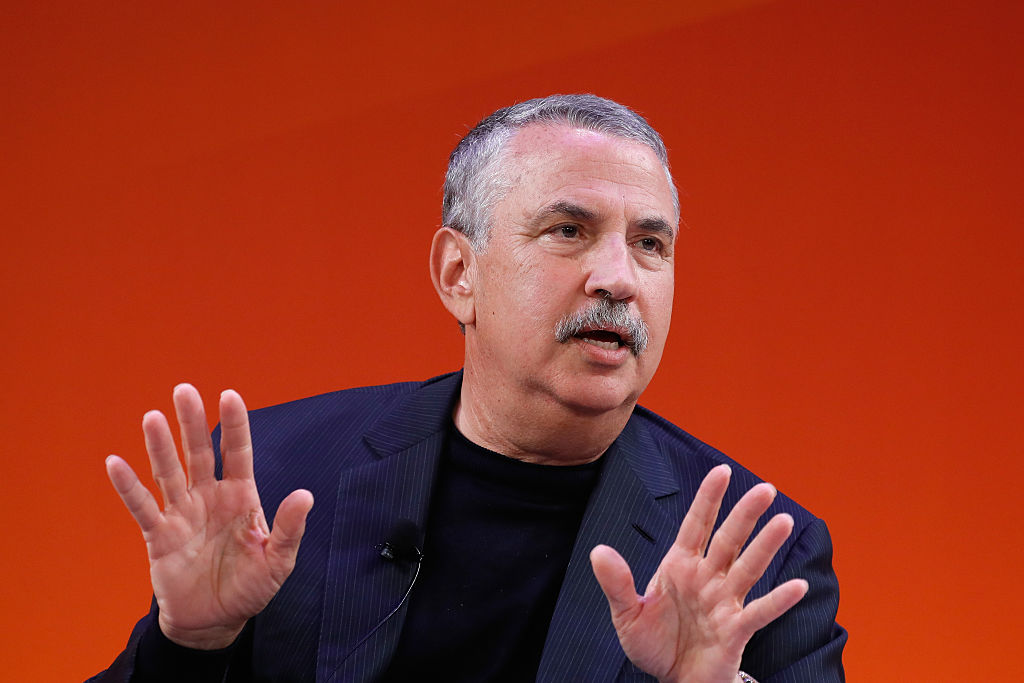If you want to know why American foreign policy has repeatedly failed to achieve its goals since the end of the Cold War, consider the wisdom of Thomas L. Friedman. His column at the New York Times is a weathervane of expense-account groupthink as it charges in the wrong direction.
When American jobs were outsourced in the Nineties, Friedman cheered for globalization. When the George W. Bush administration pushed for invading Iraq, Friedman promoted the mad and dangerous idea that post-Saddam Iraq would become a liberal democracy. And you just knew that Obama’s Middle East policies were going to be a disaster when the Times boasted that the bumbling ringmaster had ‘sounded out’ Friedman as his chief clown. Friedman couldn’t sound out his own backside without a map and a lamp.
Friedman advises nations to accept a ‘golden straitjacket’ of an open-border economy and society, and accept the loss of sovereignty for rewards on the balance sheet. He likes autocrats and technocrats, because democrats have to take the public’s doubts into account. In 2009, Friedman praised the communist leaders of China as ‘reasonably enlightened people’. In 2018, he called Saudi autocrat Mohammed bin Salman the fulfillment of the Arab Spring. So of course Friedman calls Brexit ‘stupid’ and orders the British to stay in the opaque, autocratic and undemocratic European Union.
The philosopher-king’s take on Brexit is his typical mixture of Midwestern gee-shucking and historical buffoonery, with Nineties-style technocracy as the only acceptable answer. The European Union, Friedman writes, is the ‘world’s largest market for the free movement of goods, capital, services and labor’. In choosing to leave the EU, Britain ‘a country that’s determined to commit economic suicide but can’t even agree on how to kill itself’. In 1776, the British Empire was the world’s largest market for the free movement of goods, capital, services and labor. Friedman, with his impeccable grasp of the wrong move, would have been a Tory.
The EU economy has grown slower than Britain’s every year since 2008. The EU is ruled, as Friedman admits, by ‘faceless EU bureaucrats in Brussels’, who are not elected by the voters of Europe, but in secret negotiations between national governments. The EU has catastrophic youth unemployment in its south, and raging Islamism in the cities of its north. The EU cannot police its borders, and cannot bother to create an army of its own, but it preaches to the world and views the United States not as an ally, but as a competitor that must pick up the tab for the EU’s military defense. The EU’s leading economy, Germany, is cozying up to Russia. The EU talks of free trade but imposes internal and external protectionism — great if you’re a French cheesemaker, but possibly fatal if you’re an African fruit grower.
Friedman pretends that the British have ‘gone mad’. After all, their ‘elites’ created ‘modern parliamentary democracy, modern banking and finance, the Industrial Revolution and the whole concept of globalization’. This is a classic Friedman falsehood. All of these British creations came mostly or entirely from the middle classes. If they were Catholic, Jewish or members of Protestant sects, legal obstacles prevented the ingenious commoners from joining the elites.
That’s not the only false history here. Friedman says that the EU and NATO were created to prevent ‘competitive nationalism’. NATO wasn’t built to prevent ‘competitive nationalism’. It was built to keep nuclear-tipped communist imperialism out of western Europe. The EU and its precursor bureaucracies did nothing at all to resist the Soviet Union collectively, and a great deal to enable the Soviets individually. The publics of core EU members like France and Italy elected substantial ‘Eurocommunist’ parties. In the final years of the Cold War, Germans rioted against the installation of American weapons on their soil. Without American protection in Cold War, there would be no EU today.
Combining folky guff with false history and what the mullahs of Iran call ‘global arrogance’, Friedman claims that he knows all about Britain because he went to graduate school there — in the 1970s. This, he says, is ‘not the reasonably competent British government that I grew up with’. Friedman has false memory syndrome. The Labour governments of his Sixties’ childhood mismanaged the economy so badly that they had to devalue the pound. The Labour government that Friedman knew when he lived in England from 1976 to June 1979 was a disaster: record unemployment, the breakdown of public services, strikes and power-cuts, and the massive popular disgust that was to elect Margaret Thatcher in May 1979.
The problem with Brexit, Friedman says, is that ‘you can’t fix stupid’. There is nothing stupid about Brexit, unless, like Friedman and the unelected technocrats he idealizes, you think you know better than the plebs. Only a glib simpleton would think that all the complexities of Brexit have arisen from stupidity. The crucial complexities have arisen from democratic procedure and the democratic pluralism of the Conservative party.
The objective of Brexit was set by referendum, but the procedural path to Brexit runs through the public chambers of Parliament. The result of a yes-no exercise in direct democracy has become jammed up in the procedures of representative democracy. This jam has been compounded by Theresa May’s inept election campaign of 2017, which left her with a minority government, and by the range of opinion on Brexit within the Conservative party. All of this might be unfortunate, but none of it is stupid or mad.
Friedman threatens Britain with ‘serious economic pain’, just as he threatened the Serbs with bombing them back into the Middle Ages. For proof, he quotes Airbus executive Tom Enders. Airbus has just canceled production of its A-380 flagship, because it misread the future of air travel. The prognostications of Airbus executives are like those of Friedman himself: the threat and bluster of the technocrats when faced with an inconvenient truth of democracy. If Tom Friedman is against Brexit, you know it’s going to work out fine.

























